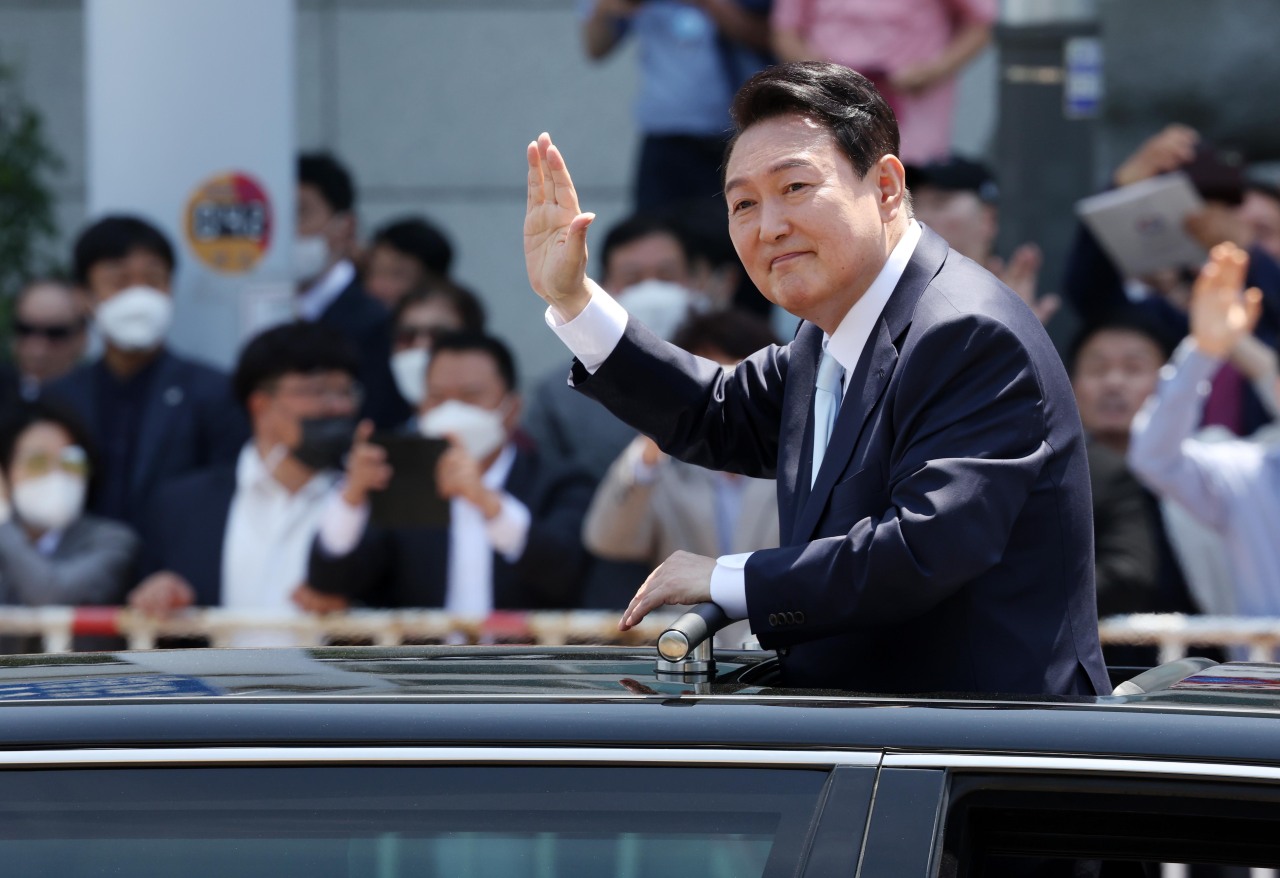President Yoon Suk-yeol, a political novice who rose to the nation’s top post less than a year after entering politics, faces the tough task of bridging the divide in public sentiment.
But his relatively weak and fragile support base makes an already difficult task more daunting.
Seemingly reflecting the close-fought race between Yoon and his rival Lee Jae-myung, surveys reveal a lack of public optimism about the next five years under the Yoon administration.
Yoon beat his election opponent by just 0.73 percentage point.
According to a Realmeter poll of 2,014 adults conducted from Monday to Friday last week, 51.4 percent of respondents said they believe Yoon will do well in his presidential term, up 0.7 percentage points from a week earlier. Yoon saw his weekly rating dip to as low as 46 percent in the weeks since the election.
The president’s ratings have hovered around 50 percent since March 10, one of the lowest levels for a president-elect, reflecting the deep political division in South Korean society.
The support given to him by voters in their 20s, 30s and 60s and 70s, was seen as reflecting a desire for justice and equality in society, after perceiving the opposite in the performance of the Moon Jae-in administration.
However, the low expectations expressed in opinion surveys, hint that these groups are already disappointed with how the Yoon administration is turning out.
Yoon, as well as his presidential transition committee and the People Power Party, has faced much criticism over controversies surrounding his first Cabinet picks and failure to hold onto the promises made during the campaign.
Many voters were angered for similar reasons five years ago, as Moon was seen making controversial picks for key posts and making questionable policy decisions.
Voters in their 20s and 30s are not traditional supporters of the conservative bloc, which Yoon represented in the race.
These young voters have behaved relatively free from ideological or party allegiance, meaning those that voted for Yoon could quickly abandon him, just as they withdrew support from Moon and the Democratic Party just a few years after helping them to victory.
Yoon has also been fiercely opposed by middle-aged voters, as well as supporters of the Democratic Party, who considered Yoon an unsuitable figure to lead the country due to allegations surrounding him and his family members as well as his extensive career in the prosecution.
The fact that Lee returned to politics just two months after losing the presidential election also reflects weak public support for Yoon, a starkly different atmosphere compared to how past presidents were greeted upon starting their terms.
The so-called honeymoon phase for a new president, when voters tend to be supportive of the party the new president is associated with, may not take place at all, signaling that a rough initial phase awaits Yoon and his Cabinet.
Yoon is now challenged to find a firm support base for himself to carry out initiatives as the head of the minority government. And many of the initiatives could fail in face of resistance, even from within his own party.
Yoon’s weak political background was touted as a one of the main factors that could hinder his presidency. But making a strong impression in his early days could allow Yoon to build the support base he needs.
Despite strong pressure, Yoon has already moved to keep the Ministry of Gender Equality and Family in the first stage of his administration, despite promising to do so during the presidential campaign. The initiative was also missing from the list of 100 objectives announced for the Yoon administration to accomplish over the next five years.
While trust in Yoon foundered, Moon saw his support rating in the same Realmeter survey reach 41.4 percent, 1.4 percentage points from a week earlier. Moon saw his weekly support rating reach 51.9 percent on average during his five-year term, the highest ever rate reached by a president on their way out.
Continued support for Moon and prevailing opposition to Yoon’s moves in the transition period has provided grounds for the Democratic Party to lodge complaints and fiercely oppose Yoon’s moves. The liberal party also controls close to 170 out of 300 legislative seats at the National Assembly.
The fierce standoff between the two factions show South Korea is still facing political tension, a key challenge that Yoon has to resolve over the next five years while in his new presidential office in Yongsan-gu, central Seoul.
Even though support has dwindled, just as candlelight protesters entrusted Moon to enact equality and justice, voters hope to see Yoon bring justice and impartial government rule while representing the core values of a democratic government and working for the people.
By Ko Jun-tae (
ko.juntae@heraldcorp.com)








